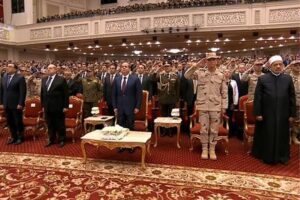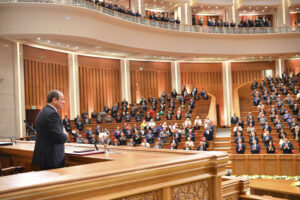President Abdel-Fattah el-Sissi of Egypt embarked on his third six-year term after a solemn swearing-in ceremony held on Tuesday (Apr. 2) at the new administrative capital outside Cairo. The event marked the continuation of his presidency, secured through a December election where he faced minimal opposition.
With the backdrop of economic turmoil and regional unrest, el-Sissi emphasized the formidable challenges facing Egypt in his address before parliament. He underscored the multifaceted nature of these challenges, ranging from domestic terrorism to global crises and regional conflicts.
In the December election, el-Sissi secured a resounding victory, garnering 89.6% of the vote amidst a turnout of 66.8% of registered voters. His opponents, though officially present on the ballot, were virtually unknown, highlighting the lack of serious contenders.
Also, read: DR Congo President Names Judith Suminwa Tuluka as First Woman Prime Minister

Egypt’s economic landscape remains a critical concern, especially as the country grapples with the aftermath of the COVID-19 pandemic and the decline in dollar revenues from the Suez Canal. Recent attacks on ships in the Red Sea by Yemen’s Houthis have exacerbated the situation, further straining Egypt’s economic stability.
El-Sissi’s ascent to power traces back to 2013 when he ousted the democratically elected Islamist Mohamed Morsi. Since then, he has navigated Egypt through a series of political and social transformations. His initial election victory in 2014 was followed by a re-election in 2018. Subsequently, constitutional amendments extended his second term by two years and paved the way for his third-term candidacy.
The ceremony not only marked the beginning of a new presidential term but also symbolized Egypt’s resilience in the face of adversity. As President el-Sissi embarks on his third tenure, he faces the daunting task of steering the nation towards prosperity while navigating the complex web of regional and international dynamics.
